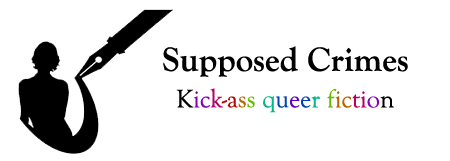
I'm going to get a little personal here as I wrap up our Pride-themed month. I hope many of you were able to attend festivities (or will be able to; in my city, Pride is next month).
When I began writing seriously in 2013, I had no intention of publishing. I just wrote a novel to see if I could, thanks to National Novel Writing Month. I ended up with 50k words of what would be my first published book. It wasn't meant to be LGBTQIA+-themed, either. Let me tell you, I was a nervous wreck at including gay and bisexual characters. I was not yet out myself, and I had just left a religious environment hostile to the community.
I came out in 2014, about eight months before my novel debuted. The reason was that I didn't feel it was honest to write LGBTQIA+ books while still being closeted and writing under my real (albeit pre-married) name. Note: This is my experience; your mileage may vary on that subject.
From a young age, I'd always felt caught between two worlds. I was raised in an interfaith family with two very strong cultural and religious heritages. When I started getting crushes on people of more than one gender, I didn't even know the word bisexual (in fact, I didn't hear the word until I was 15, by which time I'd been absorbed in fundamentalist-lite Christianity). I also didn't know a word for being between/both genders. I knew what transgender was, sort of, thanks to John Irving's The World According to Garp. But I also knew that wasn't me.
Fast forward to a few years ago. When I wrote Passing on Faith, it was a personal message to my newly-out self. I created the character Cat at first as pushback against femme-hating readers of gay romance. (I'll be honest, I have a weakness for femmes in real life!) Except in a sense, he and the POV character, Micah, were both...me. Micah was the embodiment of a lifetime of hurts, anxiety, and anger. Cat was both the person I wanted to be and the voice I longed to hear: someone who could say to me, "That God doesn't exist. You are not wrong or bad or broken. You are precious and loved just as you are."
This is what Pride means to me as an author. It means not just telling a good story but saying the things someone needs to hear. I make plenty of mistakes in my writing, but the one thing that my work begins with is empathy. My heart belongs to all the people like me who didn't know the words to describe their sexuality and/or gender; those who have been imprisoned by a hateful version of religion; and those who have been marginalized or stigmatized, perhaps even within the rainbow community.
What does Pride mean for you, as a writer or as a reader?
